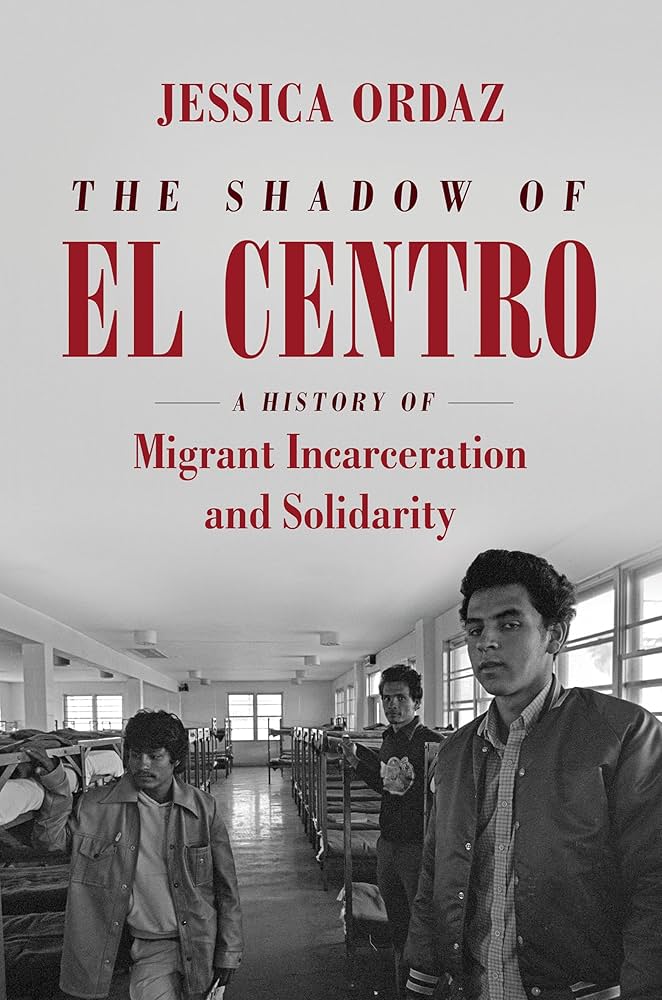What’s it about?
The Shadow of El Centro: A History of Migrant Incarceration and Solidarity by Jessica Ordaz is a critical history of immigrant detention in the United States. Through the story of the El Centro Immigration Detention Center in California’s Imperial Valley, the book uncovers how systems of incarceration, racism, and labor exploitation have shaped the lives of migrants. It also highlights the solidarity and resistance that emerged among incarcerated people and their allies.
Detailed Summary
Ordaz traces the origins of migrant detention to the mid-twentieth century, showing how Cold War anxieties, racial hierarchies, and U.S. imperialism created the foundations for mass incarceration of migrants. El Centro, situated near the U.S.–Mexico border, became a central site where these policies played out. Migrants were held not only as a matter of immigration control but also as part of a broader system of surveillance, labor control, and racial exclusion.
The book documents the harsh realities inside detention: overcrowding, poor sanitation, lack of medical care, and the psychological toll of indefinite confinement. Many detainees were farmworkers and laborers who came seeking opportunity but instead found themselves criminalized. Women and children were not spared; entire families were disrupted by raids and incarcerations. The stories reveal both personal suffering and structural violence, as the detention system dehumanized migrants and reinforced the idea that they were outsiders undeserving of rights.
Yet, alongside this history of repression, Ordaz emphasizes solidarity and resistance. Detainees organized hunger strikes, protests, and petitions, demanding dignity and humane treatment. Community groups, labor activists, students, and faith-based organizations mobilized outside the fences, building networks of support. These acts of resistance challenged the state’s power and connected migrant struggles to broader movements for racial and social justice in the U.S.
By situating El Centro in a larger context, Ordaz shows how detention is not an isolated phenomenon but part of a global pattern of border militarization and carceral expansion. The book forces readers to confront how the United States has historically relied on incarceration to manage migration, while also spotlighting the resilience and courage of those who resisted.
Major Themes
- Racism and Exclusion: Migrants, particularly from Mexico and Central America, were targeted through racialized immigration enforcement that portrayed them as threats rather than as workers or neighbors.
- Carcerality: Detention centers like El Centro functioned as prisons, blurring the line between civil immigration enforcement and criminal punishment.
- Labor and Exploitation: Migrant workers were essential to agriculture and industry, yet criminalized and confined when deemed politically or economically inconvenient.
- Solidarity and Resistance: Despite oppressive conditions, incarcerated migrants resisted, and activists outside detention walls amplified their voices, laying groundwork for today’s immigrant rights movements.
My Take
This book is both devastating and inspiring. The suffering endured by migrants at El Centro exposes how deeply racism is woven into U.S. immigration policy. At the same time, the courage of detainees who organized and resisted reminds us that even in the harshest conditions, people fight for dignity. The Shadow of El Centro makes it clear that immigrant detention is not a recent invention but a long-standing system of control—and that understanding its history is essential to dismantling it.
Memorable Quotes
- “Detention was never just about immigration; it was about power, labor, and race.”
- “Inside the fences of El Centro, migrants were treated as disposable. Yet they refused to be silent.”
- “Solidarity was the weapon of the incarcerated: a reminder that humanity could not be caged.”
